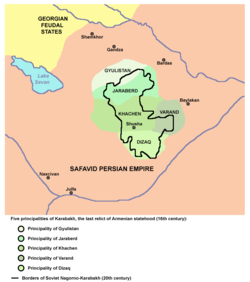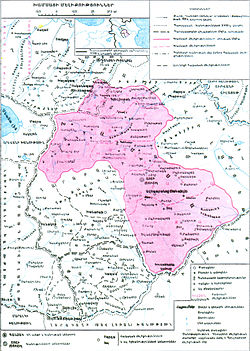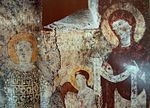- Melik
-
History of Nagorno-Karabakh
This article is part of a seriesAncient History Artsakh Middle Ages Principality of Khachen Kingdom of Artsakh Melikdoms of Karabakh Modern Era Karabakh Khanate Russian Karabakh Early 20th Century Nagorno-Karabakh Autonomous Oblast Nagorno-Karabakh War Republic of Nagorno-Karabakh
Мelik (Armenian: Մելիք melikʿ, Georgian: მელიქი meliki (prince), from Arabic: ملك malik (king)) was a hereditary Armenian noble title, in various Eastern Armenian principalities known as melikdoms encompassing modern Yerevan, Kars, Nakhchivan, Sevan, Lori, Artsakh, Tabriz and Syunik starting from the Late Middle Ages until the end of the nineteenth century.[1] After the invasions of the Seljuk Turks, Persians and Mongols, these families saw themselves as holding onto the last bastion of Armenian independence in the region.[2]
The realm of the meliks was almost always semi-independent and often fully independent, they had their own court known as darpas, army, castles and military fortifications known as skhnakhi, carried out justice in the form of trials and collected tax. The relationship between meliks and their subordinates was that of a military commanding officer and junior officer, and not of feudal lord and a serf. Peasants were not allowed to own land, but otherwise were free and owned property. Meliks preserved their rights and privileges after Eastern Armenia became part of the Russian Empire, many of them, especially meliks from Karabakh became Russian generals.
Contents
Melikdoms of Karabakh
The five Armenian Melikdoms of Karabakh: Gulistan, Jraberd, Varanda, Khachen, and Dizak, originated in the Principality of Khachen, an ancient feudal state that existed between the 10th and 18th centuries.[3] These five principalities were ruled by the Beglarian, Israelian, Shahnazarian, Hasan-Jalalian and Avanian families respectively.[4] In 1603 Shah Abbas I recognized their special semi-independent status. Rivalries among the meliks prevented them from becoming a fomidable and a unified power against the Muslims but unstable conditions in Persia eventually forced them to forget their squabbles and seek support from Europe and Russia.[4] In 1678 Catholicos Hakob Jughayetsi (Jacob of Jugha, 1655–1680) called for a secret meeting in Echmiadzin and invited several leading meliks and clergymen. He proposed to head a delegation to Europe. The Catholicos died shorlty after and the plan was abandoned. One of the delegates, a young man named Israel Ori, the son of Melik Haikazyan of Zankezur continued on and proceeded to Venice and from there to France. Israel Ori died in 1711 without seeing the liberation of the Armenian lands.[4] In the second half of the eighteenth century melik Shahnazar of Varanda allied himself with Panah Khan Javanshir, the chieftain of a Turkic tribe, against other Armenian meliks which led to the downfall of the autonomous Armenian melikdoms of Karabakh.[3] The meliks of Karabakh inspired the historical novels The Five Melikdoms (1882) and David Bek (1882) by Raffi, the opera David Bek (1950) by Armen Tigranian and the novel Mkhitar Sparapet (1961) by Sero Khanzadyan.[3] In 1944, David Bek the movie was filmed and in 1978, Armenfilm in association with Mosfilm produced another movie about the efforts of David Bek and Mkhitar Sparapet called Star of Hope.
Prominent Meliks
- Israel Ori (1658–1711)
- David Bek (d. 1728)
- Valerian Madatov (1782–1829)
- Count Loris-Melikov (1825–1888)
References
- ^ Hewsen, Robert. "The Meliks of Eastern Armenia: A Preliminary Study." Revue des Études Arméniennes. NS: IX, 1972, pp. 297-308.
- ^ Hewsen, Robert H. "The Kingdom of Arc'ax" in Medieval Armenian Culture (University of Pennsylvania Armenian Texts and Studies). Thomas J. Samuelian and Michael E. Stone (eds.) Chico, California: Scholars Press, 1984, pp. 52-53. ISBN 0-8913-0642-0
- ^ a b c Jack Hacikyan, Agop (2005). The Heritage of Armenian Literature: From the Sixth to the Eighteenth Century. Detroit: Wayne State University Press. pp. 5–6. ISBN 0-8143-3221-8.
- ^ a b c Bournoutian, George (1997). "Eastern Armenia from the Seventeenth Century to the Russian Annexation" in The Armenian People From Ancient to Modern Times, Volume II: Foreign Dominion to Statehood: The Fifteenth Century to the Twentieth Century. Richard G. Hovannisian (ed.) New York: Palgrave Macmillan. p. 86. ISBN 1-4039-6422-X.
External links
Categories:- Armenian noble titles
- History of Armenia
Wikimedia Foundation. 2010.



